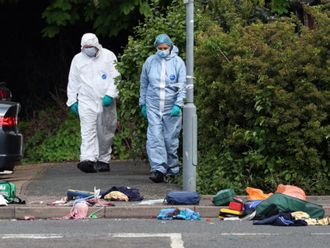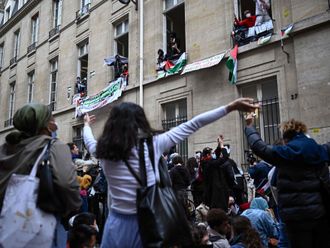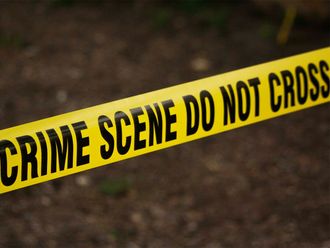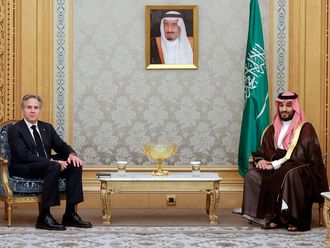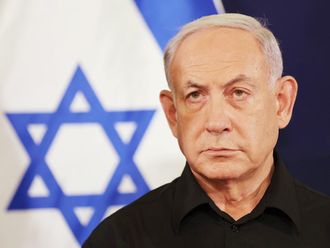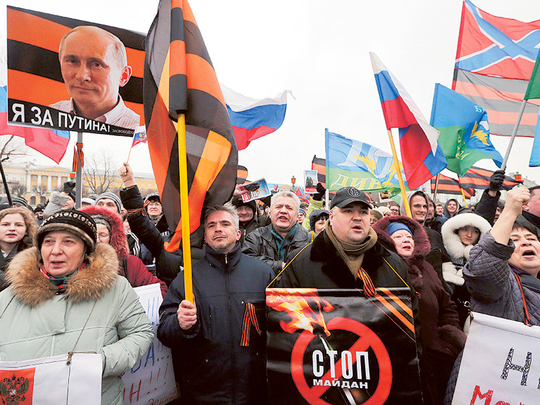
LUGANSK, Ukraine: Pro-Russian rebels prepared Saturday to swap prisoners with their Ukrainian government foes as part of a battered ceasefire, as an adviser to Ukraine’s president said Kiev had lost 179 troops in fighting over the past month.
In an exchange the West hopes will cool a deadly conflict that has poisoned relations with Moscow, around 40 prisoners on each side — some of them wounded — were to be handed over in the rebel stronghold of Lugansk, the rebels’ official for human rights Daria Morozova said.
The US and Britain, meanwhile, said they were considering imposing further sanctions against Russia.
“We are talking about additional sanctions, additional efforts. We’re not going to sit there and be part of this kind of extraordinarily craven behaviour at the expense of the sovereignty and integrity of a nation,”
US Secretary of State John Kerry said in London before talks with British counterpart Philip Hammond.
The detained Ukrainian troops due to be exchanged were taken to Lugansk in a convoy that included invited journalists, who saw the bearded and tired-looking soldiers. One had his arm bandaged.
The move came as Yuri Biryukov, an adviser to Ukraine’s President Petro Poroshenko said on his Facebook page that 179 Ukrainian troops had died in the one-month battle with pro-Russian rebels that ended in defeat over the key eastern town of Debaltseve.
If that figure is confirmed, it would represent one of the bloodiest losses suffered by the Ukrainian side in the 10-month conflict.
Defence Minister Stepan Poltorak on Saturday raised the official death toll from 13 to 20 for the retreat from Debaltseve on Tuesday and Wednesday when the town was overrun by the pro-Russian separatists in defiance of the UN-backed truce.
There was no immediate confirmation of the prisoner swap from the Ukrainian side, although smaller exchanges have taken place from in past weeks with little fanfare.
If it goes ahead, the exchange would be a rare act of compliance with the truce that has been repeatedly violated since coming into effect February 15.
The final days of the battle for Debaltseve, when the pro-Russian separatists overran the strategic transport hub midway between Donetsk and Lugansk, were the most egregious breach of the ceasefire.
The offensive forced 2,500 Ukrainian soldiers to flee under fire, leaving 112 as prisoners of the rebels.
Germany and France, which brokered the truce agreed by Ukraine, the rebels and Russia, are standing by it despite the many violations.
“We don’t have any illusions” about the difficulty involved, German Chancellor Angela Merkel said after meeting French President Francois Hollande in Paris on Friday.
But she said she was “even more convinced” a negotiated solution was the only way to end the conflict, which the United Nations estimates has killed 5,700 people since it began in April last year.
Under the truce, both sides were to withdraw their heavy weapons from the front-line by March 3, carry out a prisoner exchange, conduct negotiations on greater autonomy in rebel-held areas, and eventually restore Ukraine’s control over all of its border with Russia.
Kiev and the rebels continue to trade accusations of shelling, mortar rounds and rocket strikes targeting their positions.
Ukrainian defence officials allege that Russia has deployed 20 tanks towards the port city of Mariupol and that their forces have shot down a dozen enemy reconnaissance drones controlled from over the border.
The rebels have claimed to have pulled back weapons in some areas, but there was no confirmation from the Organisation for Security and Cooperation in Europe (OSCE), which is monitoring the truce.
They have so far barred the OSCE observers from entering Debaltseve to assess the situation, but promised they would finally be allowed in on Sunday.
Russia’s repeated denials of militarily backing the separatists have been dismissed by the West, which says it has satellite imagery and other confirmation of troop and material movements.
“Russia’s continued support of ongoing separatist attacks in violation of the ceasefire in eastern Ukraine is undermining international diplomacy and multilateral institutions — the foundations of our modern global order,” US State Department spokeswoman Jen Psaki said in Washington.
“By not abiding by the agreement they signed, by continuing to support and intervene illegally in Ukraine ... they’re violating international norms and they’re violating international law,” she said, voicing some of Washington’s harshest criticism to date of Moscow.
Moscow is under several rounds of US and EU sanctions over the crisis, but while they have accelerated Russia’s slide towards recession they have thus far failed to change President Vladimir Putin’s stance.
In one sign of the effects on Russia’s economy, rating agency Moody’s cut its debt note by one notch into “junk” territory, just a month after its last downgrade.
It said the Ukraine crisis and the fall in oil prices and the rouble will further undermine Russia’s performance.
Russia “is expected to experience a deep recession in 2015 and a continued contraction in 2016,” Moody’s said in a statement.


